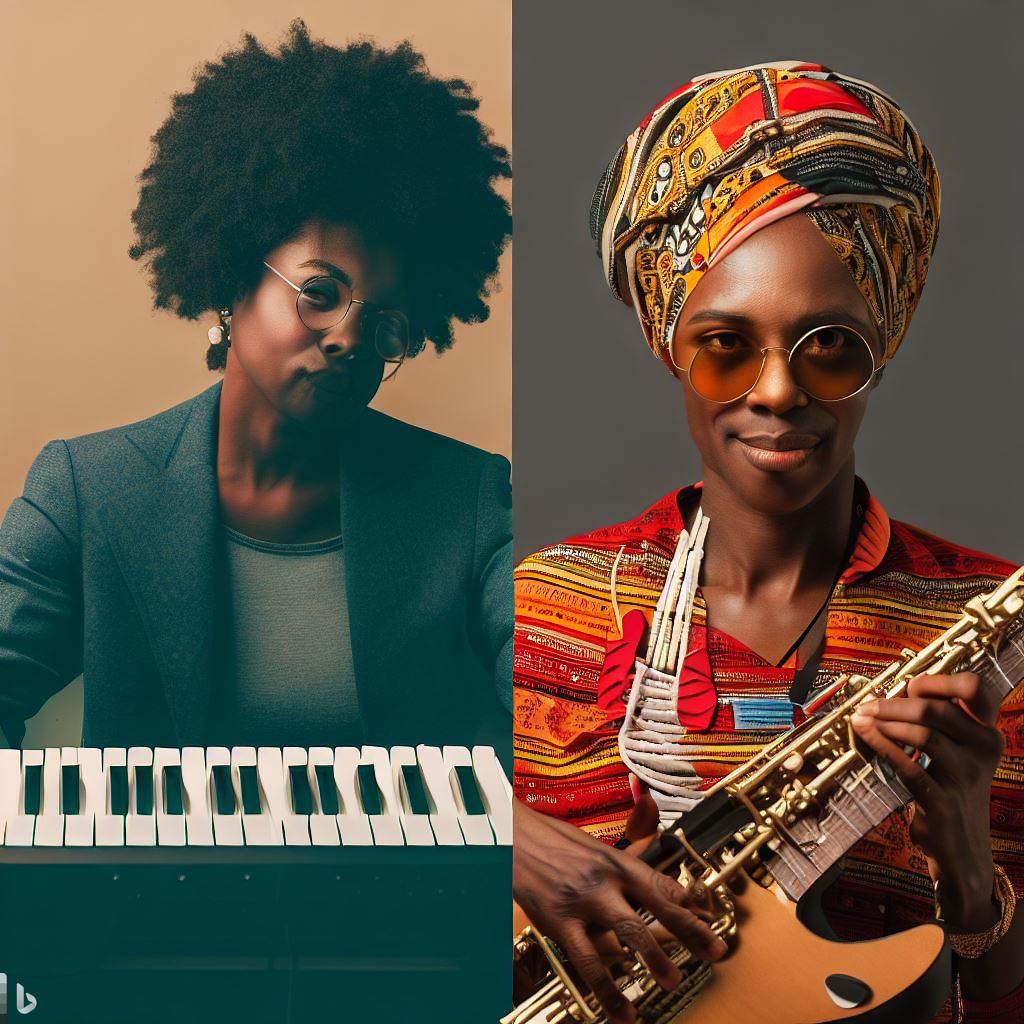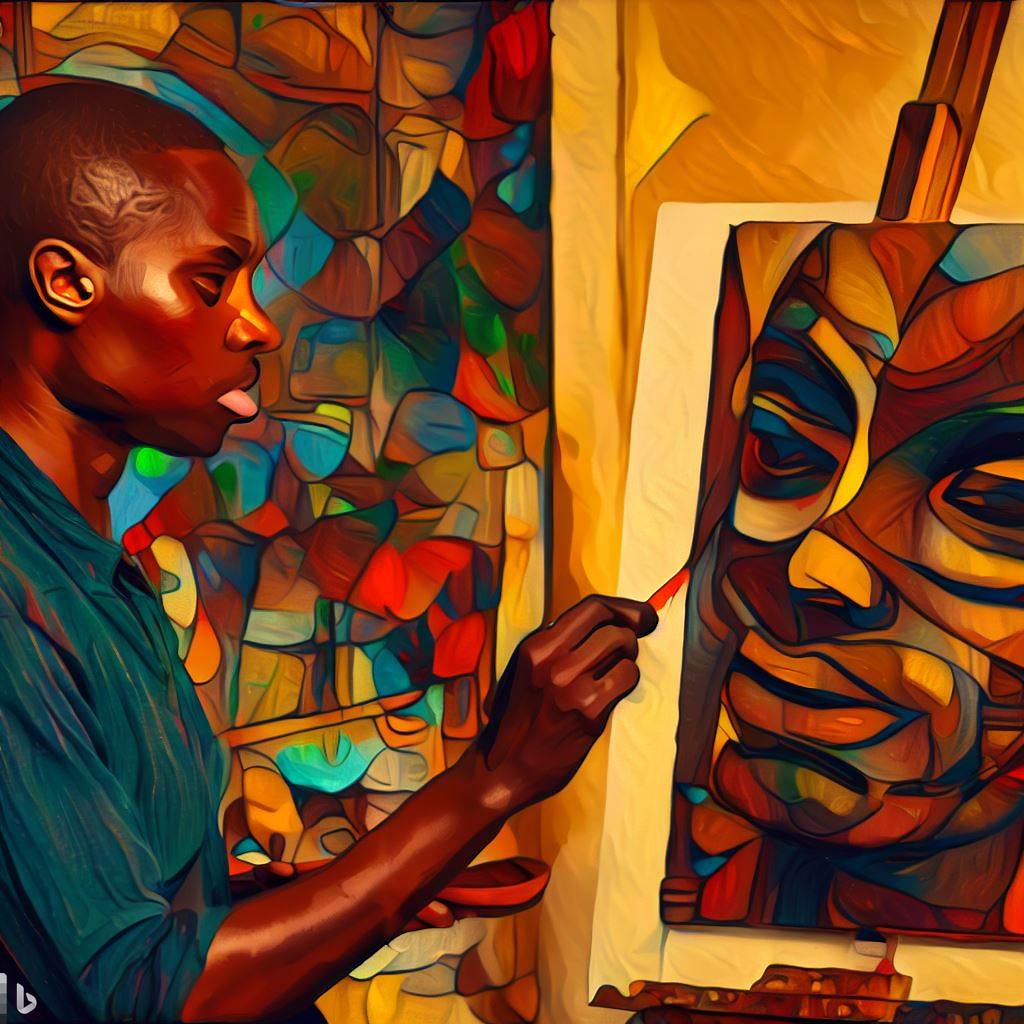Introduction
In the dynamic world of music, collaborations have become a significant aspect of creating masterpieces. Nigeria growing music industry has witnessed several successful collaborations throughout its history.
These collaborations have not only propelled the industry to new heights but also paved the way for innovative and groundbreaking music.
Nigeria’s music industry has experienced exponential growth in recent years, thanks to the immense talent and creativity of its artists.
With the rise of Afrobeats, a fusion of African sounds with Western influences, Nigerian musicians have caught the attention of the international music scene.
This has made collaboration an essential tool for artists to expand their reach and create music that resonates with diverse audiences.
Collaborations in Nigeria have allowed artists from different genres and backgrounds to come together and combine their individual strengths.
By merging their unique styles, musicians have been able to experiment and create genre-defying music that pushes boundaries and captivates listeners.
These collaborations have not just been limited to established artists.
Many up-and-coming musicians have seized the opportunity to collaborate with more prominent figures in the industry, gaining exposure and benefiting from their experience and expertise.
This has not only accelerated the growth of these budding artists but also fostered a sense of collaboration and mentorship within the Nigerian music industry.
In the end, music collaborations in Nigeria have played a pivotal role in shaping the country’s music landscape.
Not only have they contributed to the growth of the industry, but they have also fostered a culture of collaboration and creativity.
As the music industry continues to evolve, collaborations will remain a powerful tool for Nigerian artists to create groundbreaking music and further establish their global presence.
Historical Overview of Music Collaborations in Nigeria
Music Collaborations in Nigeria: A Historical Overview
Collaborations have always played a significant role in shaping Nigeria’s music industry.
From the early days of Nigerian music, artists recognized the power and potential of joining forces to create something extraordinary.
These collaborations not only showcased the immense talent present in the country but also enabled artists to explore new sounds and reach wider audiences.
Let’s take a closer look at some of the noteworthy music collaborations in Nigeria’s history.
Early Music Collaborations in Nigeria’s History
In the early days of Nigerian music, collaborations were already gaining momentum.
In the 1960s, popular highlife musicians Victor Olaiya and Bobby Benson joined forces, creating timeless hits like “Baby Jowo” and “Taxi Driver.”
These collaborations brought together different styles of music and captivated listeners across the nation.
Impact of Collaborations on the Nigerian Music Industry
The impact of these early collaborations cannot be overstated. They set the stage for future generations, encouraging artists to explore outside their comfort zones and embrace collaboration as a means of growth.
By merging diverse genres and infusing local sounds with international influences, collaborations became a catalyst for innovation within the Nigerian music industry.
Key Artists Who Pioneered Collaborations in the Past
Several key artists were instrumental in pioneering collaborations in Nigeria. Fela Kuti, the legendary
Afrobeat pioneer, not only collaborated with fellow Nigerian musicians but also international artists such as Ginger Baker, creating tracks like “Black Man’s Cry” that transcended boundaries.
Fela’s collaborations served as a bridge between different cultures and expanded the global reach of Nigerian music.
Another artist who revolutionized collaborations was King Sunny Ade. Known for his mastery of juju music, Ade collaborated with Stevie Wonder on the hit song “Aura.”
This collaboration introduced juju music to an international audience and solidified Ade’s position as a global music icon.
In recent times, the Afrobeat movement has seen a surge of collaborations, pushing Nigerian music to new heights.
Artists like Wizkid, Davido, and Burna Boy have collaborated with international superstars such as Beyoncé, Drake, and Ed Sheeran, respectively.
These collaborations have not only introduced Nigerian music to a global audience but have also paved the way for African artists to thrive on the international stage.
As the Nigerian music industry continues to evolve, collaborations remain a driving force behind its success.
Artists recognize that working together enables them to tap into different creative energies, fuse genres, and explore new sonic territories.
Furthermore, collaborations provide a platform for emerging talents to gain exposure and learn from established artists, fostering a culture of mentorship within the industry.
In fact, music collaborations have played a crucial role in shaping Nigeria’s music industry throughout history.
Early collaborations between Victor Olaiya and Bobby Benson set the stage for future generations, while the likes of Fela Kuti and King Sunny Ade pushed boundaries and expanded the global reach of Nigerian music.
Today, collaborations between Nigerian artists and international superstars continue to propel the industry forward, cementing Nigeria’s position as a musical powerhouse.
The power of collaboration in Nigeria’s music industry cannot be underestimated, and it will undoubtedly play a pivotal role in shaping its future.
Read: A Guide to Cinematography Equipment in Nigeria
Key Factors That Contribute to Successful Music Collaborations
Successful music collaborations in Nigeria’s history have been driven by several key factors that contribute to their success.
These collaborations have brought together talented artists who have created groundbreaking music that resonated with audiences across the country. Let’s explore these key factors in more detail:
Importance of mutual respect and understanding between artists
First and foremost, mutual respect and understanding between artists play a crucial role in successful collaborations.
When artists respect each other’s craft and appreciate the unique qualities they bring to the table, it creates a harmonious working environment.
This mutual respect fosters collaboration and allows artists to blend their voices and styles seamlessly.
The role of shared vision and goals
Shared vision and goals are also vital in successful music collaborations. When artists have a clear idea of what they want to achieve together and align their aspirations, they can work towards a common objective.
Having a shared vision helps in creating music that has a unified message and resonates with listeners on a deeper level.
Significance of complementary skills and talents
Complementary skills and talents are another significant factor that contributes to successful music collaborations.
Artists with different skill sets and talents can complement each other and bring out the best in one another.
For example, a talented lyricist can collaborate with a skilled vocalist to create a powerful and memorable song that showcases both their abilities.
The impact of effective communication and teamwork
Effective communication and teamwork play a pivotal role in successful music collaborations. Open lines of communication between artists allow for the sharing of ideas, concepts, and creative inputs.
When artists communicate effectively, they can build upon each other’s strengths and find common ground to create something extraordinary.
Additionally, teamwork ensures that everyone involved in the collaboration feels valued and contributes to the overall success of the project.
In Nigeria’s music industry, several collaborations exemplify these key factors and have left a lasting impact. One such collaboration is between two prominent Nigerian artists, Wizkid and Tiwa Savage.
The mutual respect and understanding between these artists are evident in their music.
They appreciate each other’s unique abilities and often feature in each other’s songs, creating memorable and chart-topping hits.
Another example is the collaboration between Davido and Olamide. These artists have a shared vision of promoting Nigerian music globally.
Their collaborations have resulted in songs that celebrate Nigerian culture and have gained immense popularity both locally and internationally.
The complementary skills and talents of artists like Burna Boy and Zlatan have led to highly successful collaborations.
Their ability to fuse different music genres and showcase their individual strengths has garnered them critical acclaim and a dedicated fanbase.
Effective communication and teamwork can be seen in the collaboration between Yemi Alade and Falz.
Their songs often tackle social issues, and their ability to communicate effectively through their music has garnered widespread praise.
These artists understand the power of teamwork and use it to deliver impactful messages to their audience.
In short, successful music collaborations in Nigeria’s history are driven by key factors such as mutual respect and understanding, shared vision and goals, complementary skills and talents, and effective communication and teamwork.
These factors are essential in creating music that transcends boundaries and resonates with listeners.
As the Nigerian music industry continues to evolve, collaborations fueled by these factors will undoubtedly shape its future.
Read: Nollywood: Music and Soundtracks in Focus
Notable Successful Music Collaborations in Nigeria
Nigeria has a rich musical history, with numerous successful collaborations that have shaped the industry.
These collaborations have not only brought together talented artists, but they have also pushed the boundaries of Nigerian music on a global scale.
Here are some notable successful music collaborations in Nigeria’s history:
D’banj and Don Jazzy: The Mo’ Hits era
D’banj and Don Jazzy were a force to be reckoned with during the Mo’ Hits era. Their collaboration brought about hits such as “Why Me?” and “Oliver Twist.”
These songs not only dominated the Nigerian music scene but also gained international recognition, propelling both artists to success.
Wizkid and Davido: The rise of Afrobeats
Wizkid and Davido have played instrumental roles in popularizing Afrobeats globally.
Their collaborations, such as “Fia” and “Manya,” have garnered millions of views on YouTube and have been featured on prominent international music platforms.
The fusion of their unique styles has elevated Nigerian music to a global audience.
Tiwa Savage and Wizkid: International recognition
Tiwa Savage and Wizkid’s collaboration on the hit song “Ma Lo” put Nigerian music on the international map.
The song, with its catchy melody and infectious beats, gained significant airplay both in Nigeria and across various international music charts. This collaboration showcased the talent and versatility of these artists.
Burna Boy and Sia: Bridging global music gaps
Burna Boy’s collaboration with international superstar Sia on the song “Hey Boy” was a game-changer.
The collaboration not only bridged the gap between Nigerian and global music but also highlighted Burna Boy’s unique sound and songwriting abilities.
The song received critical acclaim and further solidified Burna Boy’s status as one of Africa’s top musicians.
Niniola and Busiswa: Cross-cultural collaboration
Niniola and Busiswa’s collaboration on the track “Magun (Remix)” was a cross-cultural partnership that showcased the vibrant sounds of South Africa and Nigeria.
The song was a massive hit, blending the distinct sounds of both artists seamlessly. This collaboration demonstrated the power of cultural exchange in the music industry.
These collaborations exemplify the growth and success of Nigerian music in recent years.
They have not only propelled Nigerian artists to international stardom but have also opened doors for the recognition and appreciation of African music globally.
The success of these collaborations can be attributed to the unique talents and creativity of the artists involved.
By bringing together different styles and influences, these collaborations have pushed the boundaries of Nigerian music and created groundbreaking sounds that resonate with a global audience.
In general, the history of successful music collaborations in Nigeria is a testament to the talent, creativity, and international appeal of the country’s music industry.
From the Mo’ Hits era to the rise of Afrobeats, these collaborations have significantly impacted the Nigerian music scene and have paved the way for the continued growth and recognition of Nigerian music on a global scale.
Read: Rise of Indie Artists in the Nigerian Music Scene
Publish Your Professional Profile, Business or Brand
Showcase your expertise, gain trust, and boost visibility instantly on Professions.ng.
Publish Now
Impact of Successful Music Collaborations on the Nigerian Music Industry
Successful music collaborations have had a significant impact on the Nigerian music industry.
These collaborations have brought about increased recognition, popularity, and exposure for the artists involved.
As a result, their fan base has expanded, and they have reached a wider audience. This has also led to enhanced creativity and innovation in their music.
Increased recognition, popularity, and exposure for artists involved
One of the major benefits of successful music collaborations in Nigeria is the increased recognition, popularity, and exposure for the artists involved.
When two or more talented artists come together to create music, it attracts more attention from fans and the media.
This increased exposure helps the artists gain more recognition and expand their fan base. It also boosts their popularity, leading to higher album sales and concert attendance.
Enhanced creativity and innovation
Successful collaborations also contribute to the growth and development of the Nigerian music industry.
By coming together, artists from different backgrounds and genres bring a diverse range of skills, ideas, and perspectives to their music.
This leads to the creation of unique and innovative sounds that captivate audiences.
These collaborations push the boundaries of traditional Nigerian music, which helps in evolving the industry and staying relevant in the global music scene.
Broadened audience base and market reach
Furthermore, successful music collaborations have a substantial impact on the artists’ audience base and market reach.
When artists collaborate, they effectively combine their existing fan bases, resulting in a larger combined following.
This, in turn, expands their market reach and opens up opportunities for more lucrative endorsements, brand partnerships, and concert bookings.
Collaborations also allow artists to tap into new markets and reach listeners who may not have been familiar with their solo work.
Boosted international collaborations and recognition for Nigerian artists
Another significant impact of successful music collaborations is the boost they provide to international collaborations and recognition for Nigerian artists.
Through collaborations with foreign artists, Nigerian musicians have been able to reach a global audience and gain international recognition.
This exposure has opened doors for collaborations with international stars and has helped put Nigerian music on the global map. It has also contributed to the rise of Afrobeat as a popular genre worldwide.
In essence, successful music collaborations have had a profound impact on the Nigerian music industry.
They have increased recognition, popularity, and exposure for the artists involved, leading to a broader audience base and market reach.
These collaborations have also contributed to the growth and development of the music industry by enhancing creativity and innovation.
Additionally, successful collaborations have boosted international collaborations and recognition for Nigerian artists, solidifying their position in the global music scene.
Overall, collaborations have played a vital role in the success of the Nigerian music industry and will continue to shape its future.
Read: The Evolving Role of Cinematographers in Nigeria’s Cinema
Gain More Insights: Becoming an Agent: Pathways in Nigeria’s Art Scene
Challenges and Lessons Learned
Common Challenges Faced During Collaborations
- Lack of communication and coordination between the collaborating artists.
- Differences in musical styles, creative visions, and artistic preferences.
- Conflicting schedules and availability of the artists involved.
- Difficulty in managing and coordinating multiple talents and egos.
- Managing financial and contractual aspects of the collaboration.
The Importance of Trust and Dedication
Successful music collaborations in Nigeria’s history have consistently emphasized the significance of trust and dedication among artists.
It is essential for artists to believe in each other’s abilities and commit to the shared vision of the project. Trust promotes open communication, allowing for a smoother collaboration process and fostering creativity.
Effective Conflict Resolution and Compromise
Collaborations often face conflicts and differences of opinions. Resolving conflicts requires effective communication, active listening, and a willingness to compromise.
It is important for each artist to express their thoughts and concerns openly while also being receptive to the ideas and suggestions of others.
A collaborative mindset helps in finding innovative solutions and maintaining the harmony of the project.
Lessons Learned from Previous Collaborations
- Clear planning and defined roles are essential to avoid confusion and promote efficient workflow.
- Establishing a clear vision and direction for the collaboration helps in maintaining artistic cohesion.
- Building strong relationships and fostering mutual respect among the artists enhance the collaboration experience.
- Effective communication and regular check-ins are crucial for progress and timely completion of the project.
- Proper documentation of agreements and contracts protects the interests of all parties involved.
- Learning from past mistakes and acknowledging feedback helps to improve future collaborations.
In a nutshell, successful music collaborations in Nigeria’s history have faced various challenges but have provided valuable lessons.
By acknowledging the common challenges faced such as communication issues and conflicting schedules, artists can work towards better coordination.
Trust, dedication, effective conflict resolution, and compromise are instrumental in maintaining a harmonious collaboration.
Learning from previous collaborations helps in refining the process and ensuring future success.
With these lessons in mind, Nigerian artists can continue to create remarkable music collaborations that shape the country’s vibrant music industry.
Conclusion
Successful music collaborations have played a pivotal role in Nigeria’s music history.
These collaborations have had a significant impact on the Nigerian music industry, bringing about innovation, growth, and success.
The importance of successful music collaborations cannot be overstated. They have helped Nigerian artists gain international recognition and expand their fan base.
Collaborations have also created a platform for cultural exchange and the fusion of different music genres, leading to the birth of unique sounds.
Looking ahead, there are numerous ongoing and future opportunities for collaborations in the Nigerian music industry.
With the rise of digital platforms and social media, artists now have easier access to connect and work with their counterparts locally and globally.
This opens up possibilities for more diverse collaborations and the exploration of new musical territories. It is crucial for artists to embrace collaboration as a means of growth and success.
Collaborating allows artists to tap into different creative energies, learn from one another, and push the boundaries of their musical abilities.
It also provides an avenue for mutual support and encouragement among artists, fostering a sense of community within the industry.
By embracing collaboration, artists can not only enhance their own careers but also contribute to the overall development and growth of the Nigerian music industry.
The power of collaboration should not be underestimated, as it can lead to transformative experiences, breakthroughs, and the creation of timeless music.
Successful music collaborations have proven to be a driving force in Nigeria’s music industry.
They have helped elevate Nigerian music on a global scale, fostered creativity and innovation, and created opportunities for artists to flourish.
It is essential for artists to recognize the potential of collaborations and to actively seek and embrace such opportunities for their own growth and the advancement of the industry as a whole.




